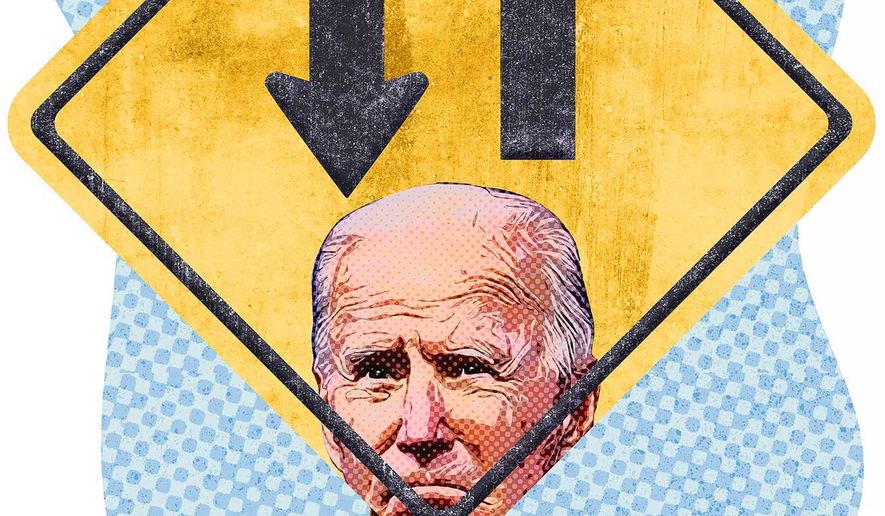OPINION:
New inflation data show annualized inflation persistently above 8%, with inflation over the past 3 months running at almost 10%. Federal Reserve Chair Jerome Powell said that “we have both the tools we need and the resolve it will take” to deal with it.
But Mr. Powell cannot do the job alone. In order to reduce inflation without driving the economy into a recession, he needs help from Congress and President Biden: a reversal of anti-growth policies, some instituted by executive order, that are raising prices and contributing to inflation. Specifically, Mr. Powell needs lower government spending, no new taxes and more energy production.
Prior to the COVID-19 pandemic, America had the strongest economy in the world, was energy independent, and was poised for expansive future growth. In the second half of 2020, America rebounded from the pandemic. But Mr. Biden dismantled pro-growth policies and the Gross Domestic Product shrank in real terms in the first quarter of 2022.
Will the economy see another quarter of declining GDP, which would mean the economy is in a recession? No one knows. The important question is this: Does America now have policies in place to lift sustainable growth and help Mr. Powell rid the economy of inflation? Unfortunately, the answer is no.
Spending — Despite strong GDP growth in the second half of 2020, Mr. Biden proposed, and Congress passed, more than $4 trillion in new federal programs, or approximately 26% of a $24 trillion U.S. economy, one of the largest increases in government spending in history. The expanded spending programs were inflationary, unnecessary, and wasteful of taxpayer dollars.
Build Back Better, Mr. Biden’s proposals to raise taxes and entitlement spending did not have the 50 votes to pass the Democrat-controlled Senate in 2021. If some version of the bill were to pass in 2022, its provisions would discourage more people from working, making supply chain problems and inflation even worse.
Taxes — In Build Back Better, in his Fiscal Year 2023 Budget, and in a May 10 speech Mr. Biden proposed new taxes that would reduce American jobs, slow American growth and diminish the prospects for innovation and entrepreneurship in America. That is a prescription for an uncompetitive economy, further reducing economic growth.
On the individual side, Mr. Biden has proposed raising the top tax rate from 37% to 39.6%; taxing unrealized capital gains at death; raising the top tax rate on capital gains and dividends from 20% to 39.6%; and imposing a wealth tax for those with net wealth of over $100 million. These families would face taxes on the value of assets, such as stocks, bonds or private companies, even before they are sold — without an equivalent credit when the value of the asset declined. This would result in people hiding assets that are harder to tax. This translates into less capital for productive investment, decreased productivity and fewer jobs — a worse environment for economic growth.
On the corporate side, Mr. Biden proposes to raise taxes to 28%, up from the current rate of 21%. When average state and local taxes are added, the rate would be 32%, well above the 23% average of other developed countries. This would encourage capital to move offshore in search of lower rates.
Energy — America has been, and should still be, the largest producer of energy in the world. Mr. Biden has adopted policies to ensure that America is neither energy independent nor generating more energy. Cutting energy production at home, while encouraging hostile countries to expand their production, further shifts U.S. economic growth overseas and contributes to slower growth. Mandating that all cars sold in America run on batteries will cause the United States to be dependent on China for vehicular transportation.
Median weekly earnings for America’s 117 million full-time wage and salary workers rose by almost 5% over the past year, but due to the higher than expected 8.3% inflation rate, Americans’ real incomes are declining by over 3%. When Mr. Biden took office in January 2021, the inflation rate was 1.4%, but by the end of 2021, it was running at 7%. Inflation is acting as a hidden tax on Americans’ incomes, reducing the ability to buy goods and services.
This decline in real wages limits Americans’ ability to purchase goods and services and could cause the economy to shrink again in the second quarter. Two-quarters of shrinkage are termed a recession. As inflation reduces Americans’ real incomes, raising prices and decreasing the ability to buy goods and services, businesses will see a decline in sales, leading to lower earnings.
Mr. Biden’s agenda includes raising taxes; substantially increasing government spending, including entitlement payments; imposing burdensome regulations on businesses and ordinary Americans; and forfeiting America’s energy independence. To avoid recession and reduce inflation, it’s time for a change.
• Diana Furchtgott-Roth, former chief economist at the U.S. Department of Labor, is an adjunct professor of economics at George Washington University. David McIntosh is president of the Club for Growth. This op-ed is excerpted from a white paper published May 11, 2022.




Please read our comment policy before commenting.